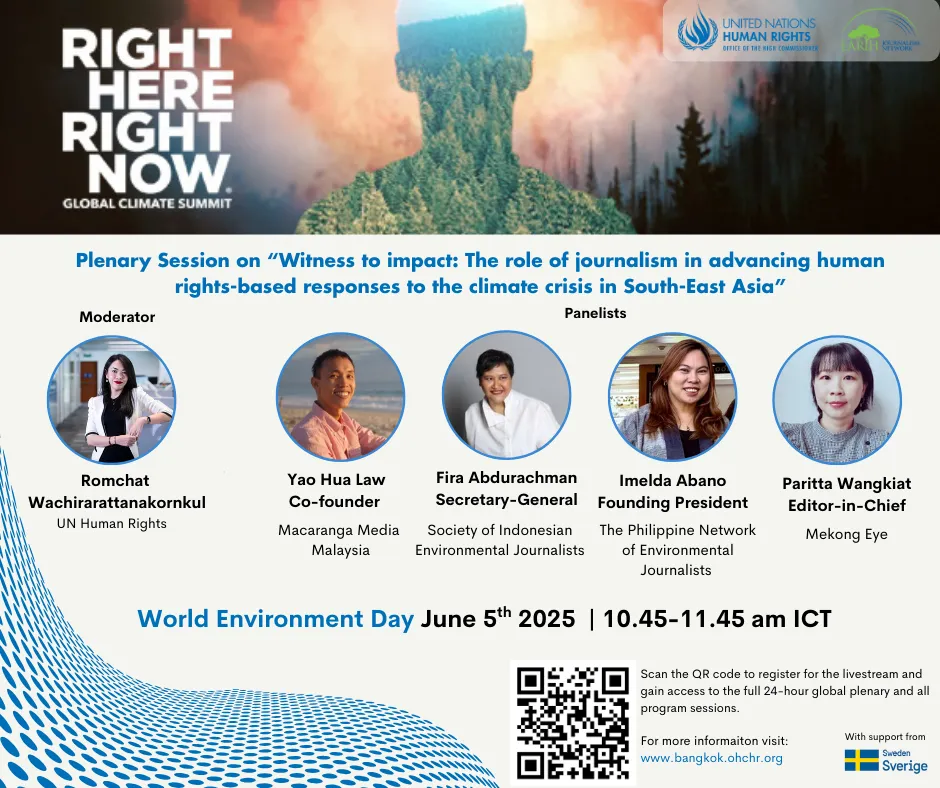
Climate change is a human rights crisis.
United Nations Human Rights and the University of Oxford are hosting the Right Here, Right Now Global Climate Summit, convened by the International Universities Climate Alliance (IUCA), bringing together global experts from various sectors to discuss impacts, obligations and effective responses to the climate crisis.
Join us, virtual registration is open to all.
Global Plenary Session: Witness to impact: Journalists protecting rights in a changing climate with UN Human Rights.
Date & time in local time: June 5th, 2025, 10.45-11.45 am ICT
Date & time UTC: June 5th, 2025, 03.45-04.45 am
Host: OHCHR Regional Office for South-East Asia in partnership with the Earth Journalism Network with the support from Sweden
Background:
A panel of experts will address the important role of environmental journalism in informing people and policymakers about the human rights impacts of climate change and human rights solutions to the climate crisis. The panel will explore the evolving landscape of climate and environmental journalism in South-East Asia, one of the world's most climate-vulnerable regions. Leading voices in the field will discuss emerging trends, including the rise of climate justice storytelling, as well as the significant challenges journalists face—from navigating safety risks and political pressures to overcoming resource constraints and limited access to critical information. How can human rights help journalists overcome these obstacles, amplify the voices of people in vulnerable situations, uncover environmental injustices, and inspire meaningful climate action. This thought-provoking discussion will highlight practical examples and stories that shed light on the resilience, dedication, and impact of environmental journalists as they strive to inform and inspire change.
Agenda - June 5th, 2025
Time | Activity |
|---|---|
| 9.45-10.15 | Registration |
| 10.15-10.45 | Opening session
Video Message (Global Climate Summit)
Opening Remarks
|
| 10.45-11.45 | Panel Discussion on “The role of journalism in advancing human rights-based responses to the climate crisis in South-East Asia” Panelists
|
11.45-12.00 | Closing and networking session |
Speakers’ Bio
- Yao Hua Law, Science & environment journalist, Co-founder of Macaranga Media (Malaysia)
Yao-Hua Law is a science and environment journalist. Based in Malaysia, he co-founded in 2019 Macaranga, an environmental journalism portal focused on Malaysia. Yao Hua has written for Science News, Science, Mosaic, and The Atlantic, and has produced radio documentaries. His awards include the One World Media Award for Print, the Sigma Award, and several Malaysian Press Institute Journalism awards. He also runs journalism workshops and seminars.
https://www.linkedin.com/in/yao-hua-law-92600991/
- Fira Abdurachman, Editor at Ekuatorial.com, Secretary-General of Society of Indonesian Environmental Journalists (SIEJ)
Fira Abdurachman is the Secretary General of the Society of Indonesian Environmental Journalists (SIEJ) and a freelance journalist with more than 20 years of experience. She has been contributing to national and international media, including Kompas.com, The New York Times, Wall Street Journal, CBS News, and Channel News Asia.
- Imelda Abano, Founding president of the Philippine Network of Environmental Journalists (PNEJ)
A journalist and a media trainer with over 20 years covering environment and climate-related issues in the Philippines and across Asia, Imelda has been covering the United Nations climate change conference for 17 years as a UN and Internews EJN’s fellow and media trainer. She has helped train more than 15,000 international and local journalists. For her contribution to climate change and environmental journalism, Imelda was recognized as the Philippines Climate Change Media Champion in 2018 and 2019 by Al Gore’s Climate Reality Project. She is also the Asia Development Journalists of the Year 2009, a United Nations Gold Medal Champion on Humanitarian and Development Reporting in 2009, among other international and national journalism awards. Imelda is the founding president of the Philippine Network of Environmental Journalists (PNEJ).
- Paritta Wangkiat, Editor-in-Chief, Mekong Eye
Paritta Wangkiat is the editor-in-chief of Mekong Eye, a news platform dedicated to environmental and climate reporting by local journalists in Cambodia, Laos, Thailand, Myanmar and Vietnam. She is also a member of the Earth Journalism Network, where she supports and mentors journalists in covering environmental and climate issues. Paritta is a former President of the Thai Society of Environmental Journalists and an award-winning journalist with a strong track record of reporting on human rights, environmental issues, and health. Previously, her work was featured in both national and international outlets, including the Bangkok Post and The Washington Post.
